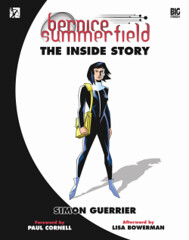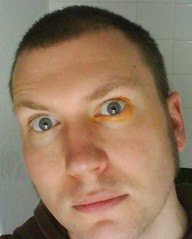Dalek I Loved You
Nick Griffiths, Orion Books 2008
Nick Griffiths writes about Doctor Who for the Radio Times. As well as covering the current series, he wrote features marking the show’s 40th birthday back in 2003 and interviewed former Doctors to coincide with the TV movie in 1996. But he’s been a fan of the show since early 1970. Dalek I Loved You is his memoir.
There’s a lot of this about. Toby Hadoke’s one-man show Moths Ate My Doctor Who Scarf got nominated for a Sony Award. In a regular column for Doctor Who Magazine, Neil Harris describes what it used to be like as fan – back when you apologised for rather than celebrated.
There’s little in Griffiths’ book a Doctor Who fan won’t already know, yet part of nostalgia’s appeal is that it’s so familiar. And this book is less for Doctor Who fans as those who lived through the 1970s. It’s a fun, lively account of that decade and of then being a grown-up. But, like a Channel 4 clips show, it’s often a sequence of “Do you remember X? They were rubbish!” followed by “And what about Y? Weren’t they brilliant?!?”
It’s told in broadly chronological order it. Griffiths himself has not had the most exciting of lives. He quotes from diaries in which nothing very exciting occurs. He goes to a poshish school where some of the teachers have nicknames. We learn he was an unexceptional student who’s then unexceptional with girls and work. There’s a divorce, a job he both likes and despises, and then a girl who might just understand him…
But he’s certainly a fan. He can describe the plots of old stories without having to look them up – well, most of them. The book is peppered with lists – things he remembers, likes or dislikes. He even times himself compiling his Doctor Who top ten. He’s got an encyclopaedic knowledge of top facts, a hunger for obscure details and a paralysing sense of embarrassment. This all suggests he has what Doctor Who Magazine once described as the “fan gene”.
Even his vocabulary is infused with fannishness. “Garb” and “arrant” are rarely used outside the Target Doctor Who books of the 1970s, and “see it in my mind’s eye” is how Mary Whitehouse decried a particular Tom Baker cliffhanger. (The book also features a lot of the script of Withnail & I.)
So what kind of fan is he? For all his nervousness, Griffiths has fiercely held opinions. He either loves something – an episode, a Doctor, a moment in his life – or he really hates it. He heckles bands and celebrities with delicious glee, and says himself that this attitude serves him well as a TV critic. Of course it’s okay for him to be less than excellent and have rubbish hair. He sees the world in black and white – either “brilliant!” or “rubbish!” – yet extremists are in his list of things that give him “the fear”.
As well as not being very self aware, many of his jokes feel too easy – received wisdom rather than thoughts he’s had himself. He swipes, for example, at Mary Whitehouse and Colin Baker. But now Griffiths is himself a father, does he not think Whitehouse could have had a point that the Doctor being drowned isn’t ideal teatime viewing? And Baker had no say in his scripts or costume or the direction the series was taking. He was just the visible one and so the obvious scapegoat.
This is the problem with what is otherwise a fun book: there are few original insights. Griffiths admits he’s not the most incisive reporter – Richard Dawkins even hung up on him in the midst of an interview. Rather this is about what Griffiths already remembers – and what he can google on the way. Even then, there are easily googlable errors: The author of Dalek is Rob Shearman, not Colin; it’s Arnold T Blumberg not Blomberg; the Doctor’s home constellation is Kasterborous, with a K not a C. As a result the book feels a little dashed off; just as Griffiths himself dashes off mid-paragraph to search a cupboard or rewatch a particular video.
It reminds me a lot of the kind of article in old fanzines about what the writer was doing when he (almost always a he) watched a particular episode. So a review of Terror of the Zygons will be as much about a family holiday in Cornwall that coincided with part three, where it rained too hard to go to the beach. Why do we need to know about the beach? Griffiths frets about his parents and son reading his shyly recounted sexual experiences – without ever explaining why he’s telling us about them in the first place.
Perhaps this grown-up stuff helps explain why he distanced himself from the series – The Five Doctors special in 1983 was, he says, like saying goodbye. For a long period – more than a third of the book – Doctor Who doesn’t even warrant a mention. Or perhaps the show hasn’t been quite as important to him as he makes out.
Until the very end, there’s little on why the show appealed to him, or has won him over anew. As a child, he says, it was just so unlike anything else – he lists the other shows he’d seen. He likes, he says, Doctor Who’s imagination, the Daleks, the escapism, the humour, the quarries. But his 12 year-old son Dylan describes something far more involved and emotional than this list suggests:
“I feel a bit embarrassed watching the New Doctor Who with my Dad because he’s more childish than I am, shouting at the TV to not look around or don’t look there and being scared when something jumps out at the Doctor. But it’s always a good laugh watching him because he is the best Dad in the world.”A friend also reminds him of a trip to a Doctor Who exhibition in the early 1990s. Griffiths had to wait until there was no one else around before gleefully trying the Dalek voice-changer. It’s telling that he doesn’t remember this himself.Nick Griffiths, Dalek I Loved You, p. 279.
The book ends oddly, with Griffiths conducting an interview he’s not very interested in and then knocking off early for a beer. You’re left wondering what he’s learnt from writing the book. Has Doctor Who shaped who he is? Has the book changed his view of himself or the show? Has it helped his parents finally understand their awkward, dorky son? Do his original props and David Tennant’s email address give him a sense of ownership of a show now so popular with everyone?
Griffiths skimps on this awkward, embarrassing stuff. Sadly that means that for all this is fun, it feels like he spent his life doing his own thing, with Doctor Who on in the background.










